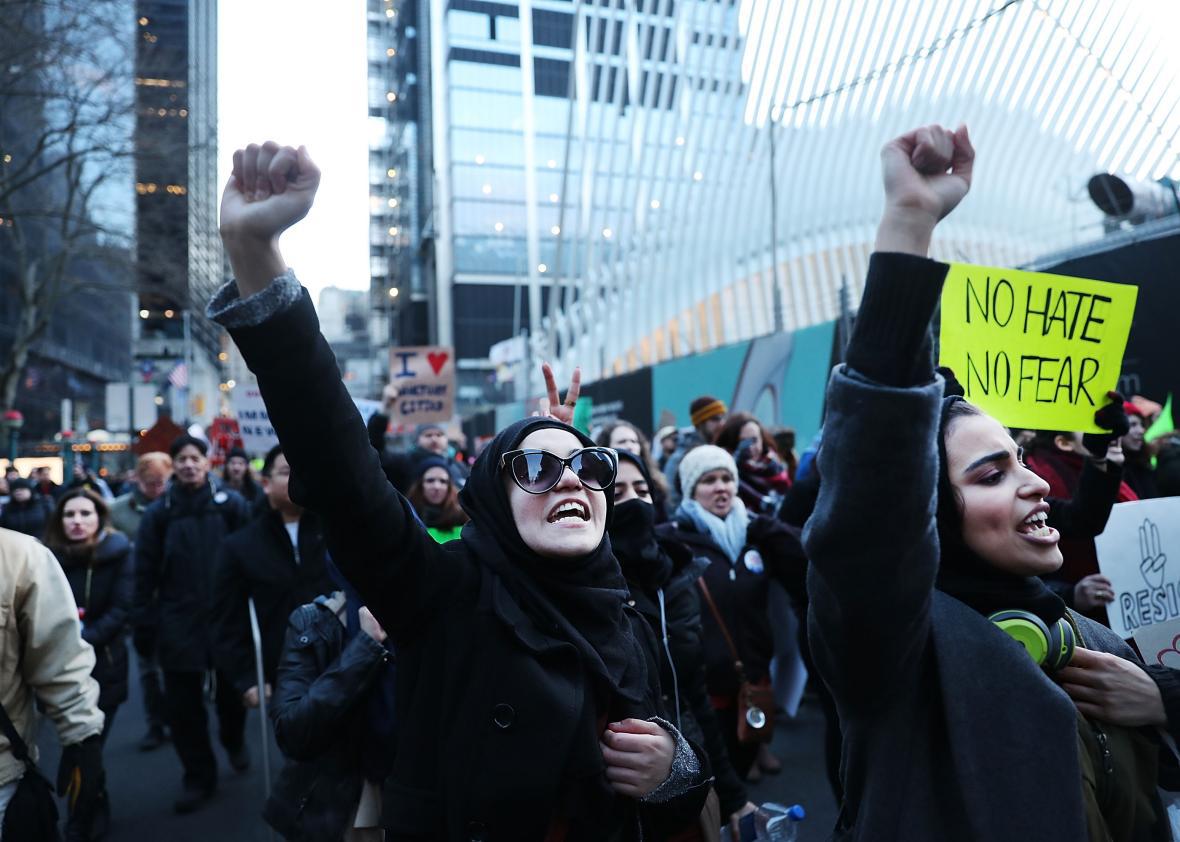Amid growing chaos and confusion across the country—and the world—regarding President Donald Trump’s executive order barring refugees and arrivals from seven predominantly Muslim countries, the commander in chief defended his order and made it clear he has no plans to back down. As large number of protesters gathered in airports across the country to protest the order that bars Syrian refugees indefinitely, suspends the nation’s refugee program for four months, and halts arrivals of citizens from seven nations—Syria, Iraq, Iran, Sudan, Somalia, Yemen, and Libya—lawyers struggled to figure out how many people were being detained by Trump’s surprisingly broad executive order that was signed on Friday. And, finally, a few Republican lawmakers decided to stand up (at least meekly) to the commander in chief.
Some of the strongest Republican criticism came from Sens. John McCain and Lindsey Graham, who issued a joint statement saying Trump’s action had been too broad and implemented too hastily. “Ultimately, we fear this executive order will become a self-inflicted wound in the fight against terrorism,” the senators said. Trump’s response? He said McCain and Graham were “wrong,” adding that “they are sadly weak on immigration” and should focus on fighting ISIS and illegal immigration “instead of always looking to start World War III.”
Trump also issued a statement claiming that while “we will continue to show compassion to those fleeing oppression,” that will be done “while protecting our own citizens and border.” He also once again said that “this is not a Muslim ban” as it “is not about religion—this is about terror and keeping our country safe.”
During interviews on the Sunday talk shows, members of Trump’s administration also defended the executive order, emphasizing that only a small percentage of travelers had been affected. The message? A few people being inconvenienced is “a small price to pay” for greater security, as White House adviser Kellyanne Conway put it.
Many weren’t buying it though, and tens of thousands of people took to the streets in cities and airports across the United States to voice their anger at the order. Some of the biggest protests took place in New York, Washington, and Boston, where thousands of people joined what were essentially quickly planned rallies.
McCain and Graham weren’t alone as a growing number of Republicans also raised questions about Trump’s order and criticized him for not doing a better job of coordinating with Congress. “We all share a desire to protect the American people, but this executive order has been poorly implemented, especially with respect to green card holders,” Senate Foreign Relation Chairman Bob Corker said. Senate Democrats, meanwhile, said they would be introducing legislation to reverse Trump’s order.
Adding to the general sense of confusion were numerous judicial rulings that put limits on Trump’s order. The first to do so was a federal judge in New York on Saturday night, but that was followed by similar rulings in Virginia, Seattle, and Boston. The latest, for example, was a federal judge in Boston who said customs officials at the Logan International Airport needed to let through passengers with valid visas to get into the country. The Department of Homeland Security vowed to comply with judicial orders but also said that Trump’s order would continue to be enforced.
In a key shift though, Homeland Security Secretary John Kelly confirmed that Trump’s order would not affect green card holders. “In applying the provisions of the president’s executive order, I hereby deem the entry of lawful permanent residents to be in the national interest,” Kelly said in a statement. “Accordingly, absent the receipt of significant derogatory information indicating a serious threat to public safety and welfare, lawful permanent resident status will be a dispositive factor in our case-by-case determinations.”
